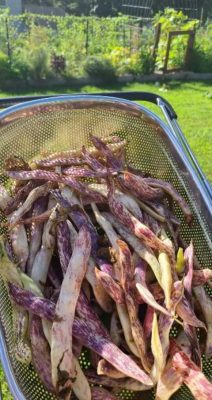Abigayle Ward, Soil Science Graduate Student

Full of fiber, packed with protein, and great to grow, beans have been a staple in the diet of humans for thousands of years. Native edible beans can be found on every continent but Antarctica, although many of the beans we eat today are domesticated varieties that originated in South America, Europe, and Asia. Fabaceae, the bean family, is one of the largest families of plants in the world, with over 20,000 species described. As legumes, beans can convert nitrogen in the atmosphere into nitrogen useable by other plants, making them very useful to integrate into crop rotation for savvy home gardeners who want to save a little money on nitrogen fertilizer. In fact, excessive nitrogen fertilization of legumes can inhibit the natural nitrogen-fixation process, so use only a low-strength nitrogen fertilizer if absolutely necessary. Legumes can even be used as cover crops in the winter to prevent soil erosion and provide a boost to your soil health all winter long. You can direct-seed beans and still get production all season, meaning Connecticut gardeners can get beans in the ground now.
Fava beans (Vicia faba) are grown all around the world, very adaptable to many climates, and are generally very easy to grow. They are cold-tolerant and can be grown all the way down to USDA Hardiness Zone 3. In Connecticut, for the best results, you should plant fava bean seeds in the early spring in a place that gets full sun and doesn’t stay too moist. They will take about three months to begin producing beans but will continue producing throughout the season and into the fall. Some frost-resistant varieties will even survive temperatures below freezing, and since they self-pollinate, bees are not necessary for the production of pods. Fava beans do not require trellises, but some larger varieties may benefit from cages or trellises for additional support. In the summer, pollinators love the flowers, and understandably so – bean flowers not only signal the coming produce but are also eye-catching. Many varieties have white and dark red flowers. Some varieties have pink flowers. Bean pods can be harvested and eaten whole if they are young and tender. It is important to note that some people may have an adverse reaction to consuming fava beans, a metabolic disorder called favism. Favism causes anemia in response to the inhalation of the plant’s pollen or consumption of the beans. Be sure to check with your doctor before trying these beans for the first time.
For “summery” beans that are native to central and south America, you can try planting kidney, cranberry, appaloosa, or navy beans, all in the genus Phaseolus. Perhaps the delight of beans in the Phaseolus genera is their diversity in appearance. Appaloosa beans are especially whimsical, with white, brown, and reddish mottling. They strongly resemble the horse for which they are named. Some of these species behave like pole beans, meaning they will need to be trellised, while others behave like bushes, meaning they should not need to be trellised. The seed packet should indicate whether they will need to be trellised. As with fava beans, be sure to water Phaseolus when the soil seems dry, taking care to avoid watering the leaves. Excessive leaf wetness may increase the likelihood for fungi to grow and cause disease.
No matter what bean you try growing, pests and disease are ever-present. Aphids, bean beetles, and European corn borer are all possible bean pests. Beans are susceptible to diseases like powdery mildew, Fusarium wilt, and bean rust. Selecting disease and pest-resistant varieties will reduce the risk of yield loss. Like most legumes, the ideal soil pH for growing beans is 6-7. Since native Connecticut soil typically has a pH closer to 5.5, be sure to send a soil sample to the UConn Soil and Nutrient Analysis Lab to test the pH (and nutrients!) of your soil before planting to ensure you get accurate recommendations for any amendments your garden may need to allow beans to thrive!
The UConn Home & Garden Education Center supports UConn Extension’s mission by providing answers you can trust with research-based information and resources. For gardening questions, contact us toll-free at (877) 486-6271, visit our website at homegarden.cahnr.uconn.edu, or reach out to your local UConn Extension center at cahnr.uconn.edu/extension/locations.
This article was published in the Hartford Courant Apr. 19 2025